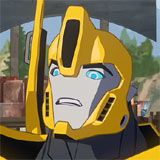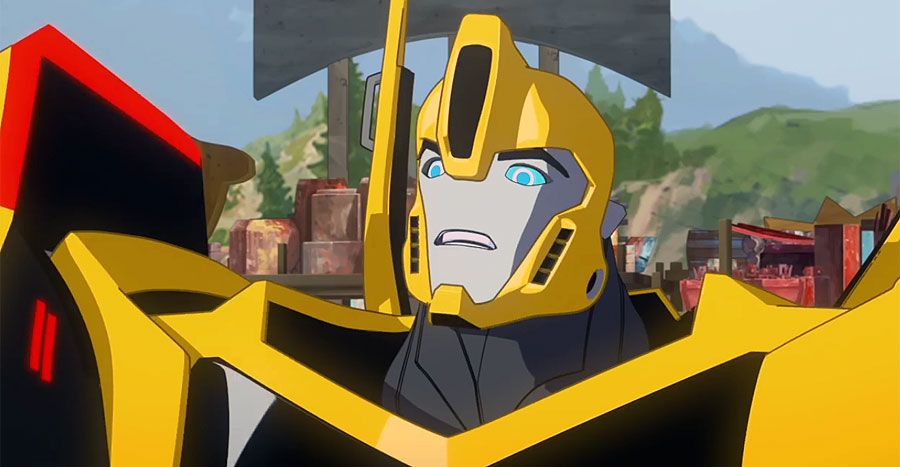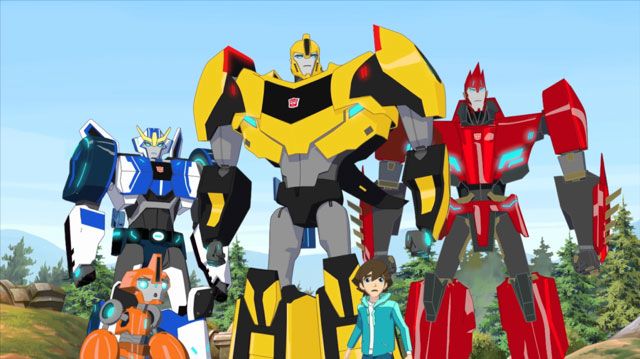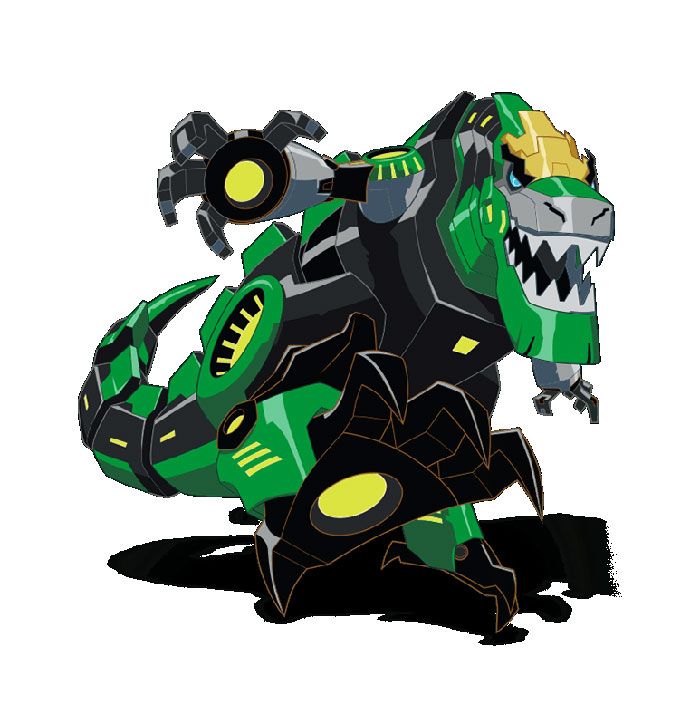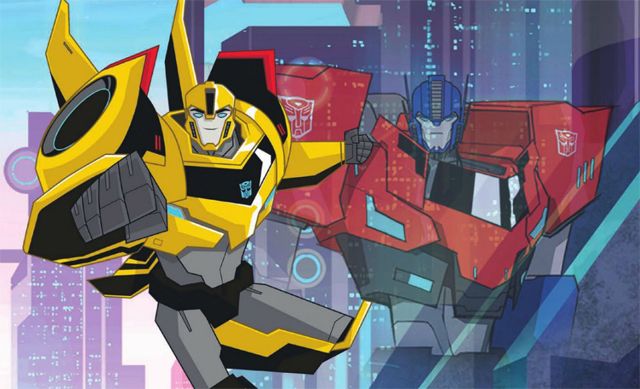For more than 30 years, the promise of two warring factions crashed on Earth and struggling to find a way home has been the cornerstone of Hasbro's "Transformers" franchise. But these days, the classic battle between Autobots and Decepticons has been getting pushed into new territory.
While a cabal of screenwriters works to launch a new cinematic universe at Paramount Pictures, a different set of changes has overtaken the franchise on Saturday mornings. That's because the latest animated series, once again titled "Transformers: Robots in Disguise,” has taken the Autobots' story and moved it into the future. Years after the events of the films and the recent "Transformers Prime" series, former sidekick Bumblebee (accompanied by allies that include a new take on Grimlock) has returned to Earth to capture a group of rogue Decepticons whose prison ship crashed.
The series marks a new era for the franchise, both on television and in toy stores (and soon in comics, with July's "Transformers: Robots in Disguise Animated" from IDW Publishing). At the front of this new direction is longtime animation and comics writer Adam Beechen.
The producer and head writer for Cartoon Network’s "Robots in Disguise," Beechen shared with SPINOFF how he's working to open up Transformers to a younger audience while building on the stories that have come before. He also explained what it's like to tap "Batman Beyond's" Will Friedel as the voice of Bumblebee, teased the show's long-term mysteries about the fate of Optimus Prime, and more.
Spinoff Online: Over the past few years, Hasbro has kept the continuity from all their various "Transformers" franchises unified in one way or another between TV and video games and comics. This show is a step forward in that idea since it takes the premise past the "Autobots and Decepticons crash-landed on Earth." What's it like to be writing what is the forefront of the canon in some respect?
Adam Beechen: I think that I had the benefit coming in of never having worked on the Transformers franchise before. I didn't write for "Prime." And so I wasn't as emotionally tied to all of the continuity elements that a lot of the people who had worked on that show had been. And it's great that they are because they're a wonderful resource for me to find out background info I need. But my main goal coming into this series was, "Let's make this a show for Bumblebee. Let's give him the exposure he hasn't really had in a brand new way." And as part of that, we get to introduce a bunch of new characters for a new generation of viewers that they can get attached to. It's still part of the larger Transformers universe, but you don't have to know 30 years of history to enjoy them, appreciate them and just have fun.
And the show then can serve as a bridge tonally between "Rescue Bots" and "Transformers Prime." The kids aging out of "Rescue Bots" can jump onto "Robots in Disguise" and still feel at home. But at the same time, they have a little bit more serious adventures with a little bit higher stakes. And then they can ease into all the giant continuity that the series have put together.
As a kid, Bumblebee was always my favorite Transformer, but as I got older I've realized that that was true for a lot of kids. They've definitely built him up as the "viewer identification" character in the modern franchises. Is that part of the reason why he's the core element that carries over from past shows?
Pretty much. Bumblebee has always been extremely popular, but at the same time he's always been the supporting character. After three decades focused solely on Optimus, really, it was just time to explore some other areas. That's not to say that Optimus isn't a part of our show. As you've seen, he is. But there's a lot of fun to be had with a character like Bumblebee who's getting a chance to lead for the first time and be his own Bot. What does that mean? How does he adjust to not having Optimus around to direct him all the time?
It just seemed like there was a lot to explore with Bumblebee, and the fact that he's theoretically closer in age to our viewers makes him more relatable than a godlike character like Optimus -- who is a great character, but who's also kind of remote from the regular viewer.
And it seems that Will Friedle doing the voice of Bumblebee, who previously was voiceless in the recent adaptations, seems like a way to highlight that younger quality. Seeing as you just finished a long run on the "Batman Beyond" comics that starred the younger take on that franchise which Will voiced, have you two talked about that kind of thematic connection?
Oh, absolutely. Will and I had a good laugh over "Batman Beyond." And he and I have had all sorts of overlap on shows that I've had some tangential involvement with over the years, and we have a lot of friends in common. And he's great to work with here, as is the rest of the cast. But it definitely feels like we're aiming for a little more light-heartedness and a little more youth and whimsy than certainly a show like "Prime" had. And I think Will's talents really lend to that. He can bring out the humor in a character in any scene without letting things get too goofy.
The premise of the show is a kind of rag-tag team of Autobots stranded on Earth with scores of Decepticons who have escaped an off-course prison ship from Cybertron. Does that setup encourage you to bring in any kind of character from Transformers past that you want?
That's exactly what we wanted to do. A lot of the development for the show was done by Jeff Kline and Duane Capizzi, who produced and story edited Prime, before I came on board – so the basics of the premise were in place. Duane and I have worked together a bunch of times - He's brought me in to write for him on several shows, and it's always been great. He's an amazing writer who's taught me a lot! When I came on board, my job was fleshing out the characters and fleshing out the relationships between the characters. And what I wanted to do was have a show where you didn't need to know everything about Transformers to appreciate what was going on onscreen. We wanted episodes that could stand on their own and where you could jump into the series at any time. And that's exactly what's happening with the show.
And mostly for the creative on this show, we could bring in any element from past Transformers canon – that's series or characters, or what have you – and have it make sense that they would appear in our world and our show. It does take place sometime after "Transformers Prime." It's not too long after, but it's enough that things have changed on Cybertron, and Bumblebee's role has changed. His occupation has changed a bit, and there has been some things that have happened in the gap that we'll be able to explore.
So are you working with Hasbro to define a lot of the characters new and old who are coming into the mix?
Oh, yes. That happens quite often. You're dealing with a lot of different groups on a show like this. There's the brand people, the toy people, the network people, the studio people ... and ideas can come from anywhere. It's a challenge, but it's also part of the fun to try to incorporate everything into the show in a way that makes some amount of sense. [Laughs]
You do seem to get to change things up with this show because, rather than the classic Autobots Team Vs. Decepticons Team, you have a lot of factions vying for attention. But I get the impression that things will build towards an eventual Decepticon team under one rule.
Well, that would be telling. [Laughs] But I will say that if you want to get them all together, you should probably introduce them individually first.
Well, you allude here to the fact that while this is a show built on new, fan-friendly single-episode stories, there are some long-term mysteries built into "Robots in Diguise" as well. For one, this is a new version of Grimlock we're meeting who was himself a prisoner along with the rest of the Decepticons, but he's lost his memory some. What did that story offer to the show as a whole?
We definitely wanted a Dinobot to be a part of our team. Dinobots are a lot of fun, and people love them, and there's a lot to explore with them. Plus, they play a great role on any team because they provide the muscle. That said, I wouldn't stress a lot over how this Grimlock ties into the overall continuity of past Transformers. This Grimlock is very much his own bot, and we're going to learn a lot more about him over the course of this first season – including why he was on the prison ship.
And the other mystery is what exactly happened to Optimus. I guess you'd call him a "spiritual adviser" to Bumblebee since we're not sure if he's actually there. Do you want to lean on that thread more or keep it as part of Bumblebee's background?
I think it's more the latter. We didn't want to make the show too continuity driven even within itself. We wanted to set up what the basic mission was – Bumblebee's team on Earth trying to round up these escaped Decepticons – and there may or may not be something bigger going on behind that. But I feel like that's a story we can get into here and there without making the show any less stand alone in feel.
So, yes, the mystery of Optimus will continue to play out. We do wind up telling you what that's all about. But it may not end up happening early in the run.
Is it liberating as a showrunner when you work with a company like Hasbro and you have a guaranteed order for a long run on the series?
It doesn't so much change your approach, but you know how many episodes you have, so you pace out the story you're telling accordingly. Typically what happens in a situation like this is that at the start of the season you sit down with the brand team and find out what their plans are in terms of the upcoming seasons – as in calendar seasons – for what toys they're releasing when and what kind of story elements they'd like to see in the upcoming episodes. You have that meeting and plan out episodes according to that, but doing so in a way that tells the best possible stories. You're not just cramming toys in there. You want to tell a cool story and help with what they're doing as well. And it just runs from there.
It's pretty rare that a brand will come back to you in the middle of your season and say, "By the way, we've come up with a new figure that will be on the shelves of the toy stores tomorrow. Get it into the next episode!" There's not any time for things like that. So after that initial meeting, you're well aware of what you want to do over the course of the season and how to make everyone happy. From there, you're free to tell the coolest stories you can.
And what about the comics side of all this? Frequently, there will be a kid-friendly comic version that ties into the show in a way that fleshes out what we see on screen. Is that the case for July's series from IDW?
We're very aware of what's happening with the comics, and we love what IDW has done with this world. That factors into our thinking, and we've had the good fortune of having one of the key comic book writers – Mairghread Scott, who you may or may not be familiar with – work with us. Mairghread was the script coordinator on our series, and she graduated quickly to being one of the key writers on the show. She is a living repository of all things Transformers, and so she knows what's gone on across every single medium the characters have ever appeared in. As we were working, she'd say, "The comics have already been there. You may want to do something different with an episode." Or she may say to the comic editors, "The show did this thing, so it would be kind of cool if you tied it in this way." I can't say for sure how all the comics will reflect the series, but we're definitely aware of each other as we go forward.
"Transformers: Robots in Disguise" airs Saturday mornings on Cartoon Network.

